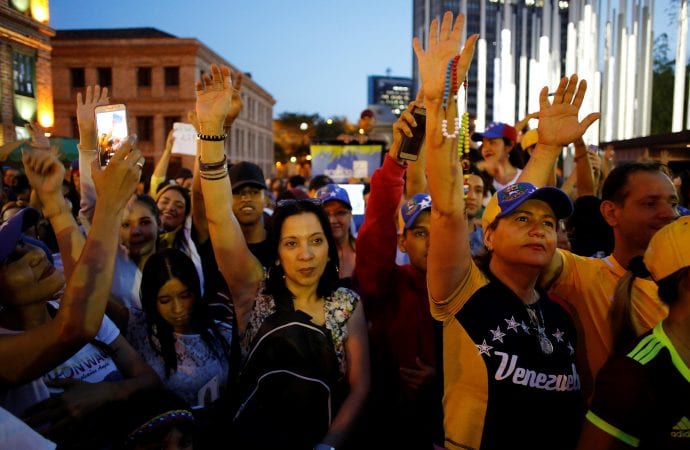Cardinal Jorge Urosa, former Archbishop of Caracas, Venezuela, says the local bishops strongly condemn what he called the “immoral” repression perpetrated by the government of President Nicolas Maduro, which, according to the United Nations, has seen at least five people killed in the past few days, three of them minors.
“The bishops maintain our position to call for peaceful and democratic solutions,” Urosa told Crux. “We consider that the ongoing repression is immoral, as is the fact that the current political leaders want to remain in power despite the heartache, pain, and economic and structural disaster that Venezuela is currently in.”
“We maintain our unity, our closeness and accompaniment with the people of Venezuela,” he said.
The bishops of Venezuela gathered April 29 to May 1 in what was supposed to be a general assembly, although the prelates ended up working in small groups as only 26 could attend. According to Urosa, due to the ongoing crisis and revolt, many couldn’t travel to Caracas.
Those tensions reached another peak this week when Juan Guaido, the president of the National Assembly who was sworn in as interim president in January, attempted to supplant Maduro, who refuses to resign his post.
On Tuesday, Guaido led a civil revolt, calling for the army to swap sides and support him instead of the successor to Hugo Chavez.
According to Urosa, the cardinals also maintain their political independence and autonomy, as well as “perfect alignment with Pope Francis and the Holy See.”
In a statement released on Friday, the Venezuelan bishops’ Commission for Justice and Peace said human rights are “inviolable” and that crimes committed by government forces during peaceful rallies cannot be “justified as due obedience.”
Referring to the rallies that took place April 30 to May 2, the commission also condemned abuses of “freedom of the press, as 12 media workers were victims of diverse forms of violence.”
Five journalists were wounded, a news station was ransacked and at least three TV news stations taken off the air for reporting on the protests.
Their statement coincided with the UN-sponsored International Press Freedom Day, marked on Friday. Pope Francis was among the many international leaders who spoke up in favor of journalists being allowed to do their jobs, going to Twitter to share his message to his close to 50 million followers.
“We need a journalism that is free, at the service of truth, goodness, and justice; a journalism that helps build a culture of encounter. #DefendMediaFreedom” Francis tweeted.
In their statement, the Venezuelan bishops also said that violence by the military and Maduro’s supporters is “contrary to the obligations of respect and guarantees of human rights contemplated in the Venezuelan constitution,” and that violations of human dignity also violate international treaties the country has signed.
The commission specifically condemned a violent attack on the Church of Our Lady of Fatima in San Cristobal, Venezuela, where Maduro supporters on motorcycles interrupted a Mass earlier in the week.
The bishops called on the military and the pro-Maduro militias to respect private property and the rights of others, while calling on them to put an end to what they called the “criminal, lethal use of force,” to dismantle barriers, and urging authorities to authorize the immediate release of 300 people who were detained during the rallies.
As they have done in the past, the bishops said that such crimes should not have a statute of limitations.
In his comments to Crux, Urosa said that actions being taken by the opposition, including Guaido, are in line with exercising “internal pressure” to force the government to resign, allowing the National Assembly to call elections.
“These actions are also meant to garner the support of the international community, including the Organization of American States and the government of the United States, so that they exercise pressure over the government,” Urosa said.

